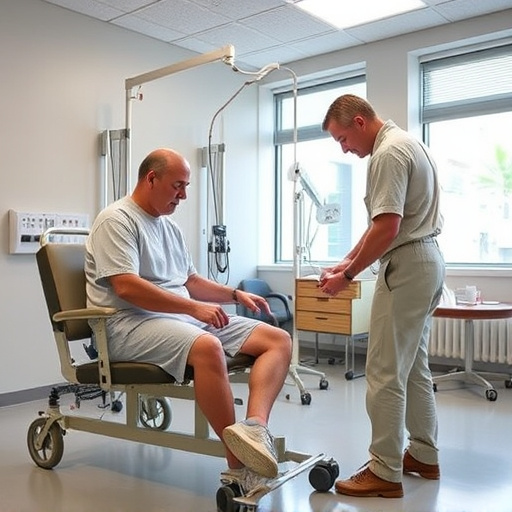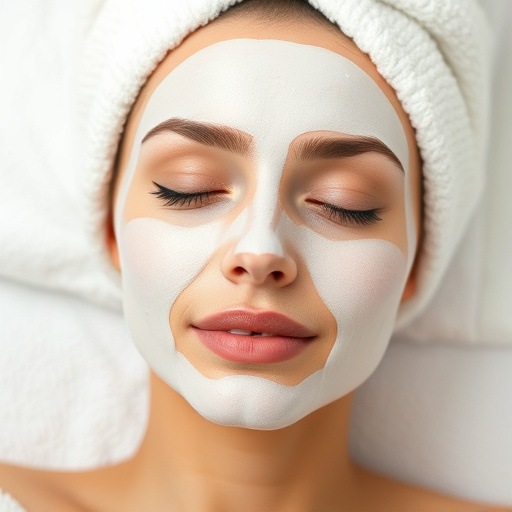For individuals with darker skin tones seeking skin resurfacing treatments, consulting a dermatologist specializing in diverse skin types is crucial. While procedures like chemical peels, laser therapy, and microdermabrasion offer benefits, they pose risks such as hyperpigmentation due to differences in melanin production and skin structure. Skilled specialists can tailor treatments like pore refinement and customized facials to minimize these risks, enhancing skin texture and tone for a radiant complexion. Always seek expert guidance from a dermatologist or qualified skincare professional for safe and effective skin resurfacing.
Is skin resurfacing safe for those with darker skin tones? This question demands careful consideration given the potential risks associated with these procedures. This article delves into the world of skin resurfacing, exploring its procedures and potential side effects. We specifically address concerns unique to individuals with darker skin, providing insights on choosing the right treatment and emphasizing the importance of expert guidance for safe and effective results. Learn how to navigate this procedure with confidence.
- Understanding Skin Resurfacing: Procedures and Potential Risks
- Addressing Concerns Specific to Darker Skin Tones
- Choosing the Right Treatment: Safety Measures and Expert Guidance
Understanding Skin Resurfacing: Procedures and Potential Risks

Skin resurfacing is a cosmetic procedure that aims to improve the appearance and texture of the skin by removing the top layer of damaged or dull skin cells. This non-invasive treatment involves several techniques, including laser therapy, chemical peels, and microdermabrasion. Each method offers unique benefits for different skin concerns, such as fine lines, wrinkles, acne scars, and uneven skin tone. However, it’s crucial to understand that these procedures carry potential risks, especially for individuals with darker skin tones.
While skin resurfacing treatments have been successful in achieving radiant, smooth skin, they may not be suitable for everyone. For those with deeper skin pigmentations or post-inflammatory hyperpigmentation, certain procedures like chemical peels and laser resurfacing can lead to temporary or permanent changes in skin color. Pore refinement and customized facials, on the other hand, offer milder alternatives that can be tailored to address specific concerns without the same level of risk. It’s essential for individuals considering these treatments to consult with a dermatologist who specializes in dermatological care for all skin types, ensuring a safe and effective experience.
Addressing Concerns Specific to Darker Skin Tones

For individuals with darker skin tones, concerns around skin resurfacing safety are valid and should be addressed proactively. While skin resurfacing treatments like chemical peels, laser therapy, and microdermabrasion have proven effective for many, their impact on darker skin can vary due to differences in melanin production and skin structure. It’s crucial to consult with a professional skincare specialist who understands the intricacies of these procedures when it comes to pigmented skin. They can tailor treatments to minimize risks like hyperpigmentation or post-inflammatory darkening, which are particularly concerning for those with deeper skin tones.
The search for safe and effective skin resurfacing for darker skin is not just about avoiding negative outcomes; it’s also about harnessing the benefits these treatments offer. Professional skincare experts can guide individuals toward specific procedures—like targeted chemical peels or advanced laser technologies—that cater to their unique needs, addressing not only acne scars or age spots but also enhancing overall skin texture and tone. With proper guidance, skin resurfacing can be a game-changer for many people, contributing to improved confidence and a radiant complexion, even in the presence of darker skin tones.
Choosing the Right Treatment: Safety Measures and Expert Guidance

When considering skin resurfacing treatments for darker skin tones, it’s crucial to understand that not all procedures are created equal. The safety and effectiveness of these treatments heavily depend on choosing the right one tailored to your specific skin type and concerns. It’s essential to seek expert guidance from a dermatologist or a qualified skincare professional who can assess your unique needs.
They will be able to recommend suitable options such as chemical peels, laser resurfacing, or microneedling therapy, which have shown promising results for skin rejuvenation. Safety measures include pre-treatment consultations, using approved products, and following post-procedure care instructions to minimize risks like hyperpigmentation or skin irritation. Remember, proper guidance and a treatment plan aligned with your needs are key to achieving safe and satisfying outcomes in skin resurfacing.
Skin resurfacing treatments can be safe for individuals with darker skin tones when performed by qualified professionals who understand the specific needs of diverse skin types. By carefully selecting the right procedure and taking necessary safety precautions, those with deeper pigmentations can achieve desired results without significant risks. Seeking expert guidance and staying informed about potential side effects is crucial to ensuring a positive outcome. With proper care, skin resurfacing offers a promising path toward enhancing skin texture and addressing various skin concerns for all ethnicities.














